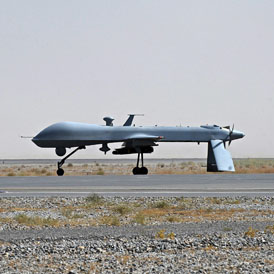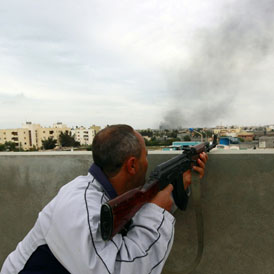US deploys unmanned Predator drones over Libya
The use of the armed drones has been approved by President Obama, and they are already in operation. Predator drones have been used extensively in Pakistan and other areas without US ground troops.

US Defence Secretary Robert Gates confirmed the deployment of drones in a news conference on Thursday evening.
General James Cartwright, vice chairman of the U.S. Joint Chiefs of Staff, said the first two Predators were sent to Libya on Thursday but had to turn back because of bad weather. He said the US planned to maintain two patrols of armed Predators above Libya at any given time.
The drones have been deployed on hundreds of missions a year in Afghanistan and Pakistan against al-Qaeda and Taliban targets, They go where its thousands of troops cannot – they are openly used in Afghanistan and covertly across the border in Pakistan, especially above North Waziristan.
The drones video militants and fire missiles at them, posing no risk to the personnel operating them remotely. They can stay aloft nearly perpetually without being noticed from the ground and hit targets with missiles.
Channel 4 News special report: secret drone warfare
Rebels fighting Colonel Gaddafi‘s rule welcomed the deployment and said they hoped the move would protect civilians.
However, involving Predator drones in the UN-campaign to protect civilians has resulted in accusations of “mission creep” in Libya. Robert Gates countered these accusations by saying President Obama opposed sending U.S. ground forces in. “There’s no wiggle room in that,” he said.
When asked why the United States did not want to increase its role in Libya, Gates said the U.S. military was already stretched thin, with 100,000 troops in Afghanistan, 50,000 troops in Iraq and 18,000 sailors on 19 ships assisting Japan after its devastating earthquake and tsunami last month.
“There was never a lack of clarity about the limits of the US role here,” Gates said.
Cameron: No ‘occupying army’
Meanwhile David Cameron has insisted there is no prospect of British forces becoming part of an “occupying army” in Libya.
Amid concerns that the recent deployment of UK military personnel as advisers to the rebels was a sign of mission creep, the Prime Minister said: “We’re not allowed, rightly, to have an invading army, or an occupying army.”
Speaking to BBC Scotland radio, he added: “That’s not what we want, that’s not what the Libyans want, that’s not what the world wants.”

Misrata
The increase in U.S. commitment to the campaign follows criticism about the lack of NATO assistance in the town of Misrata. Fierce urban warfare continues there between pro-Gaddafi forces and rebels, and hundreds of people are thought to have died during the siege there.
On Thursday, rebels and Gaddafi loyalists fought at close quarters in Misrata, which has been under siege by Gaddafi’s forces for seven weeks.
Doctors said nine rebels were killed, including four in a fierce afternoon battle around the Tripoli Street thoroughfare.
One survivor at the hospital gave a brief account of the intensity of the fighting. “We entered the building and surrounded it. Then they (Gaddafi forces) started to fire at us, using rockets. The guys started to run to the nearest houses – we were being fired on from all sides,” he said.
Rebels said 300 government soldiers and militiamen were holed up in a fortified old hospital they were using to launch mortars and rockets, taunting them and calling them “rats”.